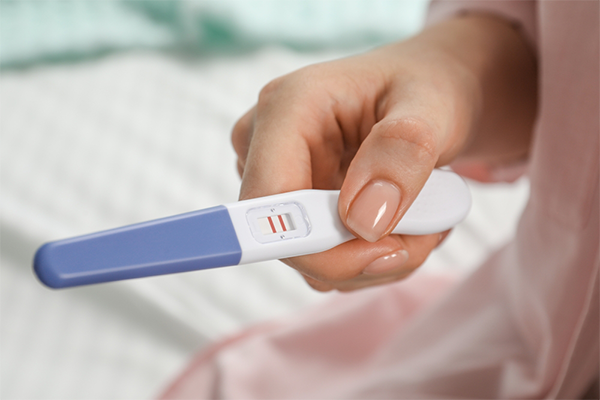
PMS Symptoms vs Pregnancy Symptoms: How to Tell the Difference
You feel tired, crave something salty or sweet, or notice your breasts are tender. These changes can mean your period is on the way or “it can also mean you’re pregnant," notes ob-gyn Dr. Jolly Belle Yap (@docjollyobgyne on TikTok and Instagram). That’s why it’s important to understand PMS symptoms vs pregnancy symptoms, so you know how to care for your body and plan your next steps.
Is it PMS or Pregnancy?
The hormone progesterone is the reason PMS and early pregnancy symptoms are so similar. After ovulation, progesterone levels rise to prepare your body for a potential pregnancy. If you conceive, progesterone levels continue to rise. If you don't, it drops, and your period starts.
Here's how to tell the difference between PMS and pregnancy symptoms with the help of Dr. Yap.
Fatigue
It's likely PMS: It’s common to feel tired with PMS, but your energy levels improve with a good night's sleep or as soon as your period begins.
You might be pregnant: Rising levels of pregnancy hormones—and the energy it takes to grow a new life—can leave you feeling completely drained during early pregnancy, notes the American Pregnancy Association.
Breast tenderness
It’s likely PMS: You might feel a dull, heavy ache in your breasts. They can feel swollen and tender, but this feeling goes away when your period starts or shortly after.
You might be pregnant: The breast tenderness can feel more intense, sensitive, or even tingly, persisting throughout pregnancy. You may notice your areolas (the area around your nipples) getting darker or larger.
“You will also notice small, raised bumps in the areola or the Montgomery tubercules,” says Dr. Yap.
Mood swings
It’s likely PMS: You might feel more irritable, anxious, or down in the days leading up to your period.
You might be pregnant: Alternatively, pregnancy mood swings can be unpredictable and, as Dr. Yap notes, “may vary per person,” swinging from sudden weepiness to excitement. A 2022 study in the Journal of Reproductive and Infant Psychology found that many expecting moms report feelings of mood instability and constant change, which can feel more intense than typical PMS moodiness.
Cramping
It’s likely PMS: Menstrual cramps can range from mild to severe and usually signal that your period is about to start.
You might be pregnant: In the first few days of pregnancy, you may experience mild cramping that feels like a pulling or tingling sensation, accompanied by some light spotting.
This cramping can happen when the fertilized egg attaches to your uterus, “and when the uterus expands to accommodate the developing baby,” explains Dr. Yap.
Bloating
It’s likely PMS: Bloating that comes and goes with your monthly cycle is a classic sign of PMS.
You might be pregnant: In contrast, pregnancy bloating is constant. A 2024 study on the physiological changes in pregnant women explains that high levels of progesterone relax and slow down your entire digestive tract, leading to bloating and constipation.
Food cravings
It’s likely PMS: You may crave specific foods, such as chocolate or salty snacks.
You might be pregnant: You have food cravings, but you can also have a form of food aversion, Dr. Yap points out. This means that while you might develop a desire for some foods, you may also experience a strong aversion to others you once enjoyed.
The Telltale Signs of Pregnancy

A strong aversion to foods you once enjoyed is a pregnancy sign that’s not typically associated with PMS.
Here are the other signs and symptoms of pregnancy:
A missed period
A missed period is usually the most obvious sign of pregnancy. If your menstrual cycle is pretty regular and your period is late, it’s time to take a home pregnancy test.
Implantation bleeding
According to the American College of Obstetricians and Gynecologists, light spotting (pinkish or brownish) may appear as the fertilized egg settles into the uterine lining.
This implantation bleeding usually happens around six to 12 days after conception, often around the time you'd expect your period. Some also report mild cramping with it.
A heightened sense of smell
You might also experience a heightened sense of smell (hyperosmia). Scents that never bothered you before could suddenly become overwhelming or even trigger nausea.
Nausea or morning sickness
Nausea, with or without vomiting, is a classic pregnancy sign. Researchers recently discovered that the likely cause of this intense nausea is a hormone called GDF15, which your placenta produces.
A constantly elevated basal body temperature (BBT)
If you track your BBT, you'll know it rises slightly after ovulation. If you’re not pregnant, it will return to baseline before your next period. If you’re pregnant, your BBT will remain elevated.
You can check this article on tracking your fertile window if you’re actively trying to conceive.
What is a False Pregnancy?
In rare cases, it’s possible to experience physical symptoms of pregnancy without actually being pregnant. This is called a false pregnancy, or pseudocyesis. It happens when a strong desire to be pregnant can cause real physical symptoms.
The mind-body connection is so powerful that intense emotions or stress can actually change your hormone levels, leading to false pregnancy signs like a swollen belly or breast changes, all without a real pregnancy.
When to Take a Pregnancy Test

Are they PMS symptoms vs pregnancy symptoms? For a definite answer, take a pregnancy test with your first morning urine.
Follow these simple tips to get the most accurate result on your pregnancy test:
- Wait at least 1 to 2 days after you miss your period, advises Dr. Yap. Testing too early can cause a false negative before pregnancy hormones are high enough to be detected.
- Use your first morning urine. This is when the pregnancy hormone (hCG) is most concentrated, giving you the clearest result.
When to See Your Doctor
Want to know if it’s early pregnancy or PMS? Consult your doctor for a clear answer. They guide you on what to do next. Schedule a visit if:
- Your home pregnancy test is positive. Your ob-gyn can confirm the pregnancy and help you start essential prenatal care.
- Your test is negative, but your period is more than a week late. A doctor can help investigate other reasons why your cycle might be delayed.
- You have severe symptoms. Intense pain, heavy bleeding, or sharp cramps require immediate medical attention to rule out any serious issues.
- Your PMS is disrupting your life. If your symptoms are PMS but are severe enough to affect your well-being, a doctor can offer treatment options.
Now that you know the difference between PMS symptoms vs pregnancy symptoms, you can better understand what’s happening in your body, whether you're watching for signs with hope or with anxiety.
Connect with other parents on the ParentTeam Moms and Dads Facebook group and ask your questions about PMS symptoms vs pregnancy symptoms.
References
American Family Physician. "Bleeding in Early Pregnancy." February 1, 2019. Accessed August 11, 2025. https://www.aafp.org/pubs/afp/issues/2019/0201/p166-s1.html.
American Pregnancy Association. "Pregnancy Cramps." American Pregnancy Association. (n.d.). Accessed August 11, 2025. https://americanpregnancy.org/healthy-pregnancy/pregnancy-concerns/cramping-during-pregnancy/.
BetterHealth Channel. "Pregnancy - signs and symptoms." BetterHealth Channel. Last reviewed April 16, 2022. Accessed August 11, 2025. https://www.betterhealth.vic.gov.au/health/healthyliving/pregnancy-signs-and-symptoms.
Cleveland Clinic. "Pseudocyesis." Cleveland Clinic. Last reviewed October 6, 2022. Accessed August 11, 2025. https://my.clevelandclinic.org/health/diseases/24255-pseudocyesis.
Eana, Armina. "Cramp Confusion: Early Pregnancy or Period? Understanding the Difference." Hackensack Meridian Health. October 22, 2024. Accessed August 11, 2025. https://www.hackensackmeridianhealth.org/en/healthu/2024/10/22/cramp-confusion-early-pregnancy-or-period-understanding-the-difference.
Feintuch, Stacey. "PMS Symptoms vs. Pregnancy Symptoms." Healthline. December 3, 2024. Accessed August 11, 2025. https://www.healthline.com/health/womens-health/pms-symptoms-vs-pregnancy-symptoms#nausea.
Johns Hopkins Medicine. "10 Early Signs of Pregnancy." Accessed August 11, 2025. https://www.hopkinsmedicine.org/health/wellness-and-prevention/10-early-signs-of-pregnancy.
MedicalNewsToday. "How to tell the difference between PMS and pregnancy symptoms." Last medically reviewed November 30, 2023. Accessed August 11, 2025. https://www.medicalnewstoday.com/articles/323122.
Mount Sinai. "Morning sickness." Mount Sinai. Accessed August 11, 2025. https://www.mountsinai.org/health-library/symptoms/morning-sickness.
NHS. "Tiredness and sleep problems in pregnancy." NHS. Last reviewed March 11, 2024. Accessed August 11, 2025. https://www.nhs.uk/pregnancy/related-conditions/common-symptoms/tiredness/.
Vaghela, D. A., V. P. Chavda, A. Kushwaha, and S. Sah. "Pseudopregnancy: when the body mimics pregnancy without a fetus." International Journal of Surgery 111, no. 6 (2025): 4119–21. https://doi.org/10.1097/JS9.0000000000002395.














